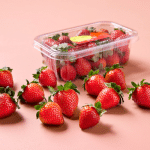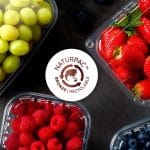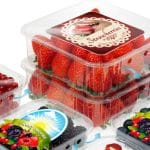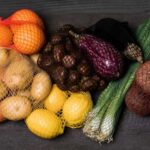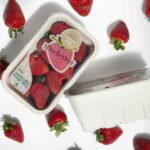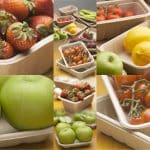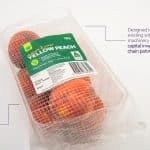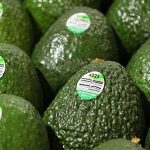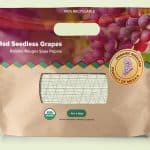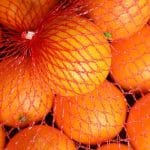What does ‘a certified label construction’ mean?
To construct a fruit label 3 components are used – adhesive, face stock and inks. If the label components used to manufacture a label are individually certified for home composting it does not mean the resulting construction is an industrial or home compostable label construction. A manufactured label must have its finished construction – face stock, adhesive and inks together – tested and passed to be able to apply for, and achieve, ‘OK compost HOME’ certification.
What is the difference between compostable and biodegradable?
Compostable products by definition are biodegradable. However, compostable products must also break down, or become part of usable, soil enriching compost in a safe and timely manner in an appropriate composting facility or home compost pile.
Biodegradable products must return to nature, disintegrating or disappearing completely. A biodegradable product may be broken down by microorganisms, but this does not necessarily imply that the product can be converted into a soil-nurturing compost.
This disintegration is not bound by time and does not need to enhance quality. Metallic or toxic residue from materials is often released in the return-to-nature process and is still considered part of biodegradation.
Are the Fruit Labels compostable and food safe?
Sinclair Fruit Labels meets all EU and FDA food safety requirements for direct contact onto fresh produce.
Sinclair Labels have very high standards for food safety and quality. As regulations change, there has been an increase in demand for supplier questionnaires and corresponding food safety requests. Naturpac supports customer’s food safety programs by providing a Quality Assurance and Food Safety (QAFS) and Declarations of Compliance.
What is the difference between ‘OK compost INDUSTRIAL’ and ‘OK compost HOME’?
Products that are solely OK compost INDUSTRIAL certified are those that compost only in industrial composting facilities (at temperatures between 55 to 60°C), so products that are solely OK compost INDUSTRIAL certified should not go into the garden compost.
Conversely, ‘OK compost HOME’ refers to products that also compost at lower temperatures, so they can go into the compost heap in a garden at home.
Zespri Case Study: Home Compostable Fruit Labels in action
Kiwifruit marketer Zespri International began trialling the Sinclair Home Compostable Fruit Label prototype in 2010.
Zespri’s Chief Innovation and Sustainability Officer Carol Ward said Zespri was thrilled to have worked alongside Sinclair to develop the new labels, and to be the first to adopt them on all organic Zespri Kiwifruit starting next season.
“Zespri is committed to sustainability, including making sure we better protect our environment, and this is another important step forward for us, helping to further reduce our environmental impact. We know our consumers want to see this sort of innovation and this is an important part of our mission to help communities and the environment thrive through the goodness of kiwifruit.”
Following certification of the new Sinclair Home Compostable Fruit Label in 2019, Zespri has continued working with Sinclair on trials of the new Sinclair Home Compostable Fruit Labels on its green and gold kiwifruit. The label’s performance has demonstrated that the new Home Compostable Fruit Label high-speed application performance is excellent.




